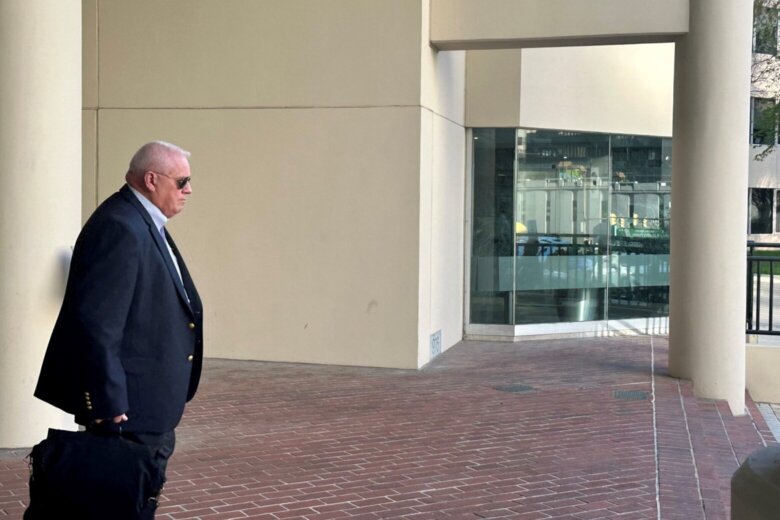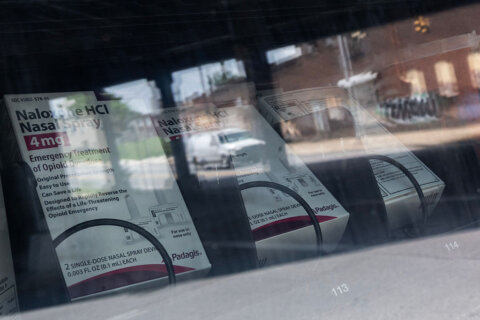This article was republished with permission from WTOP’s news partners at Maryland Matters. Sign up for Maryland Matters’ free email subscription today.

Federal prosecutors on Tuesday dropped criminal charges against Frederick County Sheriff Chuck Jenkins (R), who had been accused of using a loophole in federal law to help a local gun shop owner illegally obtain machine guns.
Assistant U.S. Attorney Christine Goo filed a motion to dismiss the case on Tuesday morning.
Jenkins and Robert Krop, owner of the Machine Gun Nest gun shop and firing range in Frederick, were charged by a federal grand jury in April 2023. Both pleaded not guilty and sought to go to trial to dispute the charges.
In late October, a federal district court jury acquitted Krop on all counts after just five hours of deliberation, following several days of trial.
Jenkins’ trial in the case had been scheduled for January, but Goo notified U.S. District Judge Stephanie Gallagher that prosecutors would be dropping charges against the sheriff. Gallagher agreed to dismiss the case shortly after noon Tuesday.
The U.S. Attorney’s Office declined comment on the dismissal. But Jenkins, in an afternoon news conference, said he was relieved to be free of what he characterized as a “malicious and … political persecution.”
“I finally have my life back, my personal life, my professional life,” said Jenkins, who referred repeatedly to the 587 days that he was under indictment.
“Today, the government finally did the right thing and dismissed the indictment with prejudice,” he said. “This has been pure hell for myself and my entire family and even my friends.”
Jenkins accused the Justice Department of trying to “ruin my reputation as sheriff … punish and financially destroy me, knowing very well I committed no crimes.”
Federal prosecutors had alleged that Krop and Jenkins conspired to get around federal law, which generally prohibits possession, transport or import of machine guns, except by government agencies.
An exception to the law allows licensed dealers, in some cases, to buy machine guns as a sample for demonstration to potential law enforcement or military purchasers, if the agency requesting a demonstration sends a “law letter” to the Bureau of Alcohol, Tobacco, Firearms and Explosives.
According to the indictment, Krop and Jenkins created five “law letters” on Frederick County Sheriff’s Office letterhead requesting machine guns for evaluation and demonstration to the department. But there was no demonstration for the agency, the indictment said, and the guns were intended for rental to Krop’s customers.
At Krop’s trial, the defense presented emails from gun shop workers to the sheriff’s office, inviting Jenkins to come by and see weapons, as well as correspondence with ATF representatives about the protocol for an off-site demonstration, the Frederick News-Post reported.
Jenkins and his attorneys said Tuesday that prosecutors simply did not have a case. Andrea Smith, a former member of the U.S. Attorney’s Office who represented Jenkins, said that, “In my experience, there was just never a case.”
“There was no evidence of a conspiracy – the sheriff and Mr. Krop didn’t know each other,” Smith said. “There was no evidence that the sheriff ever knowingly did anything with the intent to break the law, which is what the government was required to prove.”
Jenkins said he did not know Krop, and had only met him twice. He said he has not reached out to Krop since the gun shop owner was acquitted, saying there was no reason for him to do so.
Jenkins, a conservative who regularly testifies in Annapolis to oppose “sanctuary” legislation that would protect undocumented migrants, compared his indictment to the assassination attempt in Pennsylvania this summer on President-elect Donald Trump.
“It was a near miss, I was injured and I was bloodied, but I didn’t give up the fight,” he said, conjuring images of the attack on Trump.
When asked if he thought the case was politically motivated, Jenkins noted that in 18 years in office, he has “been attacked by the ACLU (American Civil Liberties Union), the NAACP, Black Lives Matter, Rise of Western Maryland, all the organizations that oppose what I do and what I stand for.”
“I can, in my mind, connect the dots. Can I prove it? Probably not,” he said, but cited his high-profile stand in Annapolis against sanctuary state laws.
Jenkins said he was offered a deal by prosecutors several months ago, to plead to a lesser charge, but he rejected it. The sheriff declined to answer questions about possible legal action against the Justice Department or about his political future, saying he was focused Tuesday on enjoying the relief of having the case dropped.
EDITOR’S NOTE: This story has been updated with Jenkins’ reaction.








